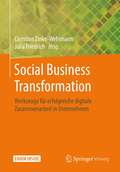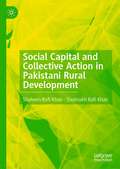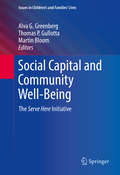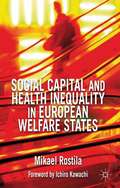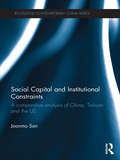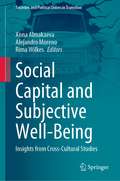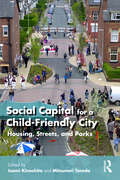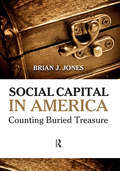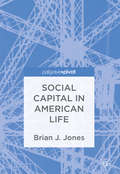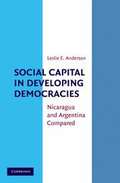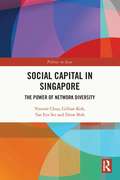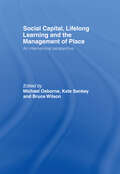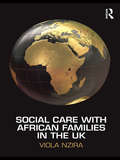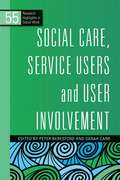- Table View
- List View
Social Brand Management in a Post Covid-19 Era (Routledge Focus on Business and Management)
by Patrícia Dias Alexandre DuarteAs activity significantly reduced during mandatory lockdown periods aiming to contain the spread of Covid-19, the relationship between organizations and their stakeholders became almost strictly digital. While some brands already have developed digital channels and made a smooth transition, others struggled to remain connected to their consumers and in the process created a panoply of new digital strategies and practices. This book discusses how the Covid-19 pandemic changed the way consumers relate with brands and how brands can reinvent, improve, or optimize themselves to meet new needs, expectations, and preferences of consumers. Drawing on empirical data about how consumers are connecting with brands in a Covid-19 recovery period, this book suggests becoming a social brand as a strategy for coping with changes in consumer behaviour. A social brand has two main dimensions: it is sociable (active on social media, humanized, and empathic) and it is socially committed (transparent and sustainable). In this concise book, the authors examine case studies of brands that coped successfully with Covid-19 and positioned themselves strongly in this post-pandemic retake period to suggest good practices. It offers an informed discussion on how brands can adapt to changes in consumer behaviour and build stronger connections with consumers. Social Brand Management in a Post Covid-19 Era provides an accessible yet comprehensive overview of brand management in a post-pandemic environment that will be of interest to marketing and communication academics, researchers, and students.
Social Business Transformation: Werkzeuge für erfolgreiche digitale Zusammenarbeit in Unternehmen
by Julia Friedrich Christian Zinke-WehlmannDie Zukunft der Arbeit verlagert sich zunehmend in den digitalen Raum. Deutsche Unternehmen positionieren sich in der Gestaltung dieses Raumes bislang häufig in der Rolle der Nachzügler, weil sie die Bedeutung des Einsatzes sozialer Technologien (z.B. Enterprise Social Networks) für das Unternehmen unterschätzen. Das resultierende Risiko im globalen Wettbewerb unterzugehen, ist gerade für den Mittelstand erheblich.Um zukunftsfähige Wege einzuschlagen, braucht es neue Gestaltungsansätze. Einer davon ist Social Business. Social Business wird im vorliegenden Werk als ganzheitliches Konzept beschrieben, welches durch den systematischen Einsatz digitaler und kollaborativer Werkzeuge neue Möglichkeiten der Innovation und Wertschöpfung schafft. Soziale Technologien ermöglichen eine proaktive Gestaltung unternehmensinterner und -übergreifender Prozesse und bieten insbesondere im Wissensmanagement, in der Kommunikation sowie der Zusammenarbeit produktionssteigernde Potenziale.Im Rahmen dieses Werkes werden praktische Anwendungen, Konzepte zur Umsetzung von Social Business und Leitlinien für den Transformationsprozess wissenschaftlich fundiert und praxisnah präsentiert.
Social Capital (Key Ideas)
by John FieldThe term ‘social capital’ is a way of defining the intangible resources of community, shared values and trust upon which we draw in daily life. It has achieved considerable international currency across the social sciences through the very different work of Pierre Bourdieu in France and James Coleman and Robert Putnam in the United States, and has been widely taken up within politics and sociology as an explanation for the decline in social cohesion and community values in western societies. It has also been adopted by policy makers, particularly in international governmental bodies such as the World Bank. This fully revised third edition of Social Capital provides a thorough overview of the intense and fast-moving debate surrounding this subject. New material encompasses: Social capital and the internet Social capital and the economists Changing policy understandings of social capital Social capital and resilience in tough times This clear and comprehensive introduction explains the theoretical underpinning of the subject, the empirical work that has been done to explore its operation, and the influence that it has had on public policy and practice. It includes guides to further reading and a list of the most important websites.
Social Capital and Collective Action in Pakistani Rural Development
by Shahrukh Rafi Khan Shaheen Rafi KhanThis book distinguishes conceptually between indigenous and constructed social capital and the associated spontaneous and induced collective action for rural development and natural resource preservation. While some of the case studies in this book show that induced collective action can lead to cost-effective, community-centric and empirically grounded rural development initiatives, other case studies show that spontaneous collective action, based on indigenous social capital, can result in resource preservation, positive development outcomes, and resistance to the excesses engendered by conventional development. The authors also explore a hybrid form whereby spontaneous collective action is given a more effective and sustainable shape by an outside organization with experience of induced collective action. Exploring alternative community-centric paths to development, especially those attuned with sustainability imperatives, is part of a global search for solutions. While the volume draws on the Pakistani case, the problem with conventional development approaches and the need for complementary alternatives is not unique to only this country; and the volume has broader relevance to students and researchers across the fields of social policy and development.
Social Capital and Community Well-Being
by Thomas P. Gullotta Martin Bloom Alva G. GreenbergThis book provides a comprehensive overview of how communities can leverage their social capital to improve overall quality of life for citizens. In addition, it offers detailed guidance on the design, implementation, and evaluation of social capital initiatives. It defines critical concepts of social capital, its decline in recent years, and the potential for rebuilding it through progressive social policy initiatives. Chapters present an innovative social policy template, Serve Here, for improving Americans' collective quality of life, starting with young adults. Serve Here sets out a comprehensive, sustainable service learning plan aimed at increasing quality higher education for young adults, reducing college debt, and enhancing long-term civic participation and community building. The book offer guidelines for developing tailored solutions to ensure greater parity of social capital to regional, demographic, and other marginalized populations. Featured topics include: The civic value of social capital. The economics of social capital in communities. Building social capital across communities by leveraging personal relationships. Social capital and returning military veterans. Millennials and social capital. Teaching the social entrepreneurs of tomorrow. Social Capital and Community Well-Being: The Serve Here Initiative is a valuable resource for clinicians and practitioners as well as researchers and graduate students in community psychology, social work, education, and healthcare policy.
Social Capital and Health Inequality in European Welfare States
by Mikael RostilaThis book sets out unique findings on whether social capital influences health and health inequalities in European welfare states. Drawing on cross-national data from the European Social Survey (ESS) as well as Swedish national survey data and registers, the book develops a new theoretical definition of social capital that guides the books empirical studies. The findings suggest that welfare state generosity is a decisive factor for social capital and that social capital is of significance for health inequalities both between and within European welfare states. The book also discusses the potential dark sides of social capital and examines evidence of circumstances in which social capital has negative health externalities.
Social Capital and Institutional Constraints: A Comparative Analysis of China, Taiwan and the US (Routledge Contemporary China Series)
by Joonmo SonThe sociological concept of social capital has grown in popularity in recent years and research programs in North America, Europe, and East Asia have demonstrated how social capital has a significant impact on occupational mobility, community building, social movement, and economic development. This book uses new empirical data to test how social capital works in different societies with diverse political-economic and cultural institutions. Taking a comparative approach, this study focuses on data from three different societies, China, Taiwan, and the United States, in order to reveal the international commonalities and disparities in access to, and activation of, social capital in labor markets. In particular, this book tests whether political economic and cultural differences between capitalist and socialist economic systems and between Western and Confucian cultures create different types of individual social networks and usages. This comparison leads to Joonmo Son’s fundamental argument that the institutional constraints of a society’s political economy on the one hand, and culture on the other, profoundly impact on both the composition and utilization of social capital. Based on rigorous statistical analysis, this book will be essential reading for students and scholars of social capital, economic sociology, and comparative politics.
Social Capital and Its Institutional Contingency: A Study of the United States, China and Taiwan (Routledge Advances in Sociology #108)
by Yang-Chih Fu Nan Lin Chih-jou Jay ChenThis volume is a collection of original studies based on one of the first research programs on comparative analysis of social capital. Data are drawn from national representative samples of the United States, China and Taiwan. The three societies selected for study allow the examination of how political-economic regimes (command versus market) and cultural factors (family centrality versus diverse social ties) affect the characteristics of social ties and social networks from which resources are accessed and mobilized.
Social Capital and Mental Health
by Kwame Mckenzie Trudy Harpham`The effects of social context and social structure on health are well documented. The concept of social capital provides a slightly different take on the issue, as it attempts to discover the features of populations in different areas that are crucial in determining the extent and the quality of social interactions and the social institutions within society. Such factors as social networks, levels of participation in civil life (as a citizen) and levels of trust within communities are all associated with social capital. This book provides a detailed exploration of the concept, on its effects on psychological functioning and on the risk factors for mental health that are associated with communities that have either high or low levels of social capital.' - Community Care Why do some areas have a higher prevalence of mental illness than others? How does the structure of a society affect its inhabitants' mental health? This remarkable book is the first to explore in detail the concept of social capital and its implications for mental health policy. Drawing on evidence from international research and fieldwork, the contributors examine the risk factors for mental health associated with both low and high social capital communities. They discuss the importance of relationships between individuals, groups and abstract bodies such as the state and outline different systems of social capital, for example intra-group `bonding' and inter-group `bridging'. The authors challenge the notion of community as a strictly area-based concept and call for broader-based studies of communities built around race, faith or even around a common social exclusion. Social Capital and Mental Health also reviews methods of measuring social capital, analyses the implications of research findings for future policy developments and makes clear recommendations for future practice and research. This book will be an informative and engaging read for sociologists and psychiatrists, and an incisive resource for policy makers and practitioners.
Social Capital and Sport Governance in Europe (Routledge Research in Sport, Culture and Society)
by Margaret GroeneveldAlthough there is significant interest in the social role of sport in fostering civil society from both policymakers and academics, there is a lack of evidence of the specific role of sport federations in this system. This book critically presents the mechanisms and structures in a selection of sport federations within a variety of European countries that illuminate the varied relationships between not-for-profit sport federations, their members, governments and the citizens they represent. The contributors explore the contrasts and synergies between core social capital theoretical perspectives, and how these may be informed by and/or shape the realities of governance from different perspectives within the sport system.
Social Capital and Sport Organisations (Routledge Research in Sport, Culture and Society)
by Richard TaconDrawing on primary research within voluntary sports clubs in the UK and secondary analysis of the wider international literature on social capital, this text focuses on the micro-processes of social capital development and how they play out in specific social settings. In so doing, it adds to existing research by developing a rich, contextualised, process-based view of social capital in action. Critically reviewing theoretical and empirical literature on social capital, the book highlights the key current debates. The empirical core of the book draws on ethnographic observation over 18 months at voluntary sports clubs in the UK, including in-depth interviews with sports club members and organisers. The text explicitly seeks to set this empirical work in its wider context, by considering the findings in relation to other international studies of social capital in both sports clubs and other types of organisation. The book draws on international research from a whole range of countries: UK, USA, Australia, Canada, Norway, Denmark, Netherlands, Japan, Vanuatu, Czech Republic, Germany, and many others. The book establishes a transferable, process-based understanding of how social capital develops – both within sports clubs and beyond. This is an illuminating reading for policymakers, practitioners, and researchers with an interest in the sociology of sport, sport development, sport management, sport policy, social theory, social policy, or social networks.
Social Capital and Subjective Well-Being: Insights from Cross-Cultural Studies (Societies and Political Orders in Transition)
by Alejandro Moreno Anna Almakaeva Rima WilkesThis book presents a cross-cultural investigation into the interplay between social capital and subjective well-being. Based on a quantitative analysis of the latest large-N cross-cultural data sets, including the World Value Survey and the European Social Survey, and covering various countries, it offers a comparative perspective on and new insights into the determinants of social capital and well-being. By identifying both universal and culture-specific patterns, the authors shed new light on the spatial and temporal differentiation of social capital and subjective well-being. The book is divided into two main parts: The first discusses mutual trust, religious and cultural tolerance, and pro-social and human values as essential dimensions of social capital. In turn, the second part studies social capital as a source of subjective well-being and life satisfaction. Given its scope, the book will appeal to scholars of sociology, social psychology, political science and economics seeking a deeper understanding of the multi-faceted nature of social capital and well-being.
Social Capital for a Child-Friendly City: Housing, Streets, and Parks
by Isami Kinoshita Mitsunari TeradaSocial Capital for a Child-Friendly City argues for the importance of relationship networks (social capital) in children’s growth and socialization, and explores how child-friendly social capital can be cultivated through urban planning and community development. As outdoor play decreases and children spend more time online, Kinoshita and Terada return to John Dewey’s proposal that social capital is essential for nurturing the next generation and establish a democratic and sustainable society. The book features examples from Sweden, Finland, Germany, Switzerland, the UK, and Japan, exploring methods for cultivating social capital and spaces for children to play and develop in cooperative housing, outdoor play spaces, streets, parks, and neighbourhoods. We express our gratitude to Dr. Marketta Kytta, Professor of Aalto University, who gave valuable suggestions about the key term ‘bullerby’ and ‘social capital’.This book will be of use to students and practitioners of urban planning and landscape architecture, as well as any community leaders or developers seeking to foster a nurturing environment where children can flourish.
Social Capital in America: Counting Buried Treasure
by Brian J JonesIn the wake of Robert Putnam's bestselling book "Bowling Alone," media and popular opinion often contend that American society is losing its cohesion. In an era of culture wars, deep political divisions, and all-consuming household technologies, are we losing our connections with one another? Is American society falling apart?Not according to this new book, which draws upon two renowned national surveys to reveal a very different picture. Jones' poignant study of social capital in America explores current trends encompassing family life, work, social networks, and more. He is able to show surprising correlations: those who most use the internet are more likely to participate in voluntary organizations; etc. In lively prose with easy-to-read charts, Jones counters the prevailing myths of American Society by confronting them with the voices of Americans, their attitudes and behaviors, and the facts of their daily lives.
Social Capital in American Life
by Brian J. JonesEmbarking from a model of social capital hinging upon four social structures—work, family, social networks, and voluntary associations—Brian Jones empirically examines the widespread claims that American society is becoming less sociable, trusting, and cooperative. Breaking down datasets drawn from the General Social Survey (conducted 27 times from 1972 to 2008), Social Capital in American Life depicts the social values drawn from the four established social structures, as well as their interrelationships, their determinants, and ultimately their social capital, through a series of statistical and econometric methods. This rigorous, empirically driven analysis reveals how American society both confirms and repudiates fears about decreased cooperation given different cases and parameters.
Social Capital in Developing Democracies
by Leslie E. AndersonDrawing on extensive field work in Nicaragua and Argentina, as well as public opinion and elite data, Leslie E. Anderson's Social Capital in Developing Democracies explores the contribution of social capital to the process of democratization and the limits of that contribution. Anderson finds that in Nicaragua strong, positive, bridging social capital has enhanced democratization, while in Argentina the legacy of Peronism has created bonding and non-democratic social capital that perpetually undermines the development of democracy. Faced with the reality of an anti-democratic form of social capital, Anderson suggests that Argentine democracy is developing on the basis of an alternative resource - institutional capital. Anderson concludes that social capital can and does enhance democracy under historical conditions that have created horizontal ties among citizens, but that social capital can also undermine democratization where historical conditions have created vertical ties with leaders and suspicion or non-cooperation among citizens.
Social Capital in Singapore: The Power of Network Diversity (Politics in Asia)
by Gillian Koh Vincent Chua Ern Ser Tan Drew ShihHow can social cohesion be achieved in a meritocratic and multicultural global city-state? Meritocracy poses a paradox: On one hand, it integrates individuals through frameworks of equal treatment, equal justice and opportunity regardless of race, language or religion. On the other hand, individuals are then segregating through academic sorting, they are rewarded based on credentials and performance which also results in elite identification and bonding. After a generation, without mitigation action, social stratification can result. Distinctive circles differentiating social elites from non-elites, the professional classes from non-professional classes emerge. The remedy the authors propose is network diversity which is the organic forming of ties across class and other social boundaries built on deliberate policies, programmes and platforms designed to facilitate that. This social mixing, forged in social infrastructure such as schools, workplaces, and voluntary associations pays off by producing the collective goods of national identity and trust. This hypothesis has been tested in the case of Singapore society and the empirical results from the research on the power of network diversity and bridging social capital are found in this volume. An insightful read for scholars and practitioners in public policy and social network analysis looking to understand the challenges faced by and the experiences that have emerged from the case of Singapore with its multicultural and cosmopolitan setting.
Social Capital, Corporate Social Responsibility, Economic Behaviour and Performance
by Lorenzo Sacconi Giacomo Degli AntoniThis book brings together an interdisciplinary group of leading experts to examine three major concepts: social capital, socially responsible behavior of economic agents and economic development. The volume studies the interplay of these issues by employing two original approaches. A micro perspective based on behavioural economic theory and game theory, focusing in particular on the relationship between social capital and corporate social responsibility (CSR) and how these support the creation of self-sustaining networks of cooperative relations. In addition to this, it provides a macro perspective on the relationship between social capital, norms of ethics and economic development. Part I concerns new perspectives on the economic theory of institutions and explains CSR in terms of reciprocity, social preferences and conformity to social norms. Part II presents the approach to social capital and CSR based on behavioral game theory and network analysis. Part III illustrates experimental and empirical evidence concerning the economic effects of social capital and other-regarding preferences. Part IV discusses the macro approach to social capital and sustainable economic development. This book is an essential reading for all interested in social capital, corporate social responsibility, economic development and their mutual relationships as they are seen through the lens of the economic theory of institutions, behavioral economics and game theory. "
Social Capital, Lifelong Learning and the Management of Place: An International Perspective
by Bruce Wilson Michael Osborne Kate SankeyWith contributions from around the world, this book brings together inter-related research from three fields: social capital, place management and lifelong learning regions. Providing valuable insight into the management of place and the development of learning at a regional level, the book presents international research that underpins the development and implementation of policies and practices that improve the quality of living and working circumstances at both local and regional levels. International in scope and at the cutting edge of research into this growing field that links lifelong learning to place, the book will appeal both to academics undertaking research in this burgeoning field and to those involved in lifelong learning at local, national and international level.
Social Capital, Political Participation and Migration in Europe
by Marco Giugni Laura MoralesHow can European societies more effectively promote the active engagement of immigrants and their children in the political and civic life of the countries where they live? This book examines the effect of migrants' individual attributes and resources, their social capital and the political opportunities on their political integration.
Social Capital: A Comparative Analysis Of China, Taiwan And The Us (Key Concepts)
by Joonmo SonSocial capital is a principal concept across the social sciences and has readily entered into mainstream discourse. In short, it is popular. However, this popularity has taken its toll. Social capital suffers from a lack of consensus because of the varied ways it is measured, defined, and deployed by different researchers. It has been put to work in ways that stretch and confuse its conceptual value, blurring the lines between networks, trust, civic engagement, and any type of collaborative action. This clear and concise volume presents the diverse theoretical approaches of scholars from Marx, Coleman, and Bourdieu to Putnam, Fukuyama, and Lin, carefully analyzing their commonalities and differences. Joonmo Son categorizes this wealth of work according to whether its focus is on the necessary preconditions for social capital, its structural basis, or its production. He distinguishes between individual and collective social capital (from shared resources of a personal network to pooled assets of a whole society), and interrogates the practical impact social capital has had in various policy areas (from health to economic development). Social Capital will be of immense value to readers across the social sciences and practitioners in relevant fields seeking to understand this mercurial concept.
Social Capital: Theory and Research
by Rene DubosLeading scholars in the field of social networks from diverse disciplines present the first systematic and comprehensive collection of current theories and empirical research on the informal connections that individuals have for support, help, and information from other people. Expanding on concepts originally formulated by Pierre Bourdieu and James Coleman, this seminal work will find an essential place with educators and students in the fields of social networks, rational choice theory, institutions, and the socioeconomics of poverty, labor markets, social psychology, and race.The volume is divided into three parts. The first segment clarifies social capital as a concept and explores its theoretical and operational bases. Additional segments provide brief accounts that place the development of social capital in the context of the family of capital theorists, and identify some critical but controversial perspectives and statements regarding social capital in the literature. The editors then make the argument for the network perspective, why and how such a perspective can clarify controversies and advance our understanding of a whole range of instrumental and expressive outcomes.Social Capital further provides a forum for ongoing research programs initiated by social scientists working at the crossroads of formal theory and new methods. These scholars and programs share certain understandings and approaches in their analyses of social capital. They argue that social networks are the foundation of social capital. Social networks simultaneously capture individuals and social structure, thus serving as a vital conceptual link between actions and structural constraints, between micro- and macro-level analyses, and between relational and collective dynamic processes. They are further cognizant of the dual significance of the "structural" features of the social networks and the "resources" embedded in the networks as defining elements of social c
Social Care Services: The Key to the Scandinavian Welfare Model (Routledge Revivals)
by Jorma SipiläFirst published in 1997, this volume aimed to study social care services as a specific type of social policy that operates on a different set of principles as supportive services rather than as poor relief or social security work. The focus is on determining what is specifically Scandinavian about the world-famous Scandinavian welfare state, with studies on issues including the origins of four social care service models, the development of local authority social services in Iceland and social services as a gender issue.
Social Care with African Families in the UK
by Viola NziraThis important text promotes understanding of the complexities and diversities of African family life. It stimulates creative thinking about how social care professionals can develop meaningful relationships and engage confidently and effectively with African families they encounter within work contexts. The book will help students and professionals to develop specific knowledge and skills for working with African families, including refugees, asylum seekers, new and settled immigrants and people of dual heritage. Whilst highlighting differences in terms of practices across the continent, the common threads and shared identities of these families can provide the building blocks for new and relevant knowledge which then inform anti-oppressive practice. Issues such as child discipline, officialdom, roles and responsibilities within the family, image and identity and the perception of others are discussed in chapters covering: • economic and social pressures • family structures • marriage patterns/partnerships • mortality and death • faith and spirituality Containing numerous illustrative examples, this accessible text will be useful to all social work and social care students.
Social Care, Service Users and User Involvement
by Edited by Peter Beresford Sarah CarrSocial Care, Service Users and User Involvement provides a definitive introduction to practical, philosophical and theoretical issues at the heart of user involvement. This book provides an accessible account of the latest research findings regarding user involvement on three levels: the delivery and provision of services, practice and practitioners, and research and evaluation. It explores a wide range of service user needs and concerns, including the latest developments in personalisation and the effect of the Equality Act 2010. First-hand accounts illustrate the range of issues and service user needs which could be addressed by increased involvement within and beyond the social care system. The book also distinguishes between user views and user involvement, and addresses their processes outcomes and impact, as well as their measurement. This book will be a key source of information for care workers, service managers, policy makers, researchers, service users and social and health care professionals involved in social care and support service planning.

